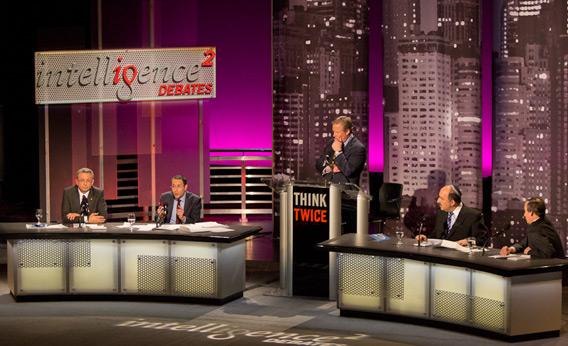This is the second to last in a series of four civic issues blogs addressing the topic of public discourse in the United States. In my first two blogs I discussed the issues I felt that have molded public discourse into the uncivilized feeding ground that it is today. That leaves a question to be posed and subsequently answered if we want to fix this: so what needs to be done? To answer this it is first necessary to understand that while there is a serious issue surrounding public discourse today there are also small caverns of old where ancient souls lie and huddle and converse in a beautiful display of civility and clarity where a persuasive and logical change in public opinion occurs. Today I will unveil one such mode of discourse from which I think we can learn from.
What I am about to introduce has been described by The New York Times as “pointed political debate minus all the shouting” and by The Wall Street Journal as “always provocative and intelligent, as well as disciplined and civil.” This organization has held debates about a countless array of topics and issues. For every debate, there is a single, clear resolution that the speakers try to persuade either for or against. These resolutions have been varied in seriousness through the years; some resolutions hit on highly controversial topics and others touch on topics with much more levity involved. Examples include “The U.N. should admit Palestine as a full member state”, “The President has constitutional power to target and kill U.S. citizens abroad”, and on a less serious note “Ban college football”, and “Men are finished”.
This organization is called Intelligence Squared (IQ2) and their goal is to get people to rethink their point of view. Based on a traditional Oxford-style debate format, IQ2 brings world leaders and renowned experts to debate over 100 debates thus far, and is continually creating more debates. The debates are highly structured, with each team member allowed a 7 minute speech followed by a clash between the debaters. The debaters then have 2 minutes to close their remarks and hopefully persuade the audience present. A moderator is in place to guide discussion and make sure debates don’t get out of hand. The audience votes on their stance in the issue before and after the debate and the team who has swayed the most votes is declared the winner. I want to point out that while there are “winners” and “losers” both the teams and audience can leave at least with a better understanding of both sides; in this regard “losing” does not necessarily result in a bitter taste after the debate.

As someone who has engaged in debate across the nation in high school, I have thoroughly enjoyed watching these debates. Not only is it interesting to hear different perspectives from enlightened scholars, but it is also captivating to analyze the debaters from a linguistic approach. The debates are rather long, but when it comes to civility and understanding, long should not have to bear a negative connotation.
All of my factual information comes from the Intelligence Squared website. Also on there are a list of all the past debates that you can watch online; you can also read the transcripts if you so desire. I highly recommend watching some just for enjoyment. If there are topics that especially gauge your interest then rock on. Also keep in mind IQ2 is just one example a working mechanism for civic discourse. Next week I will be discussing the future of public discourse.
http://intelligencesquaredus.org
Keep it cool,
K



